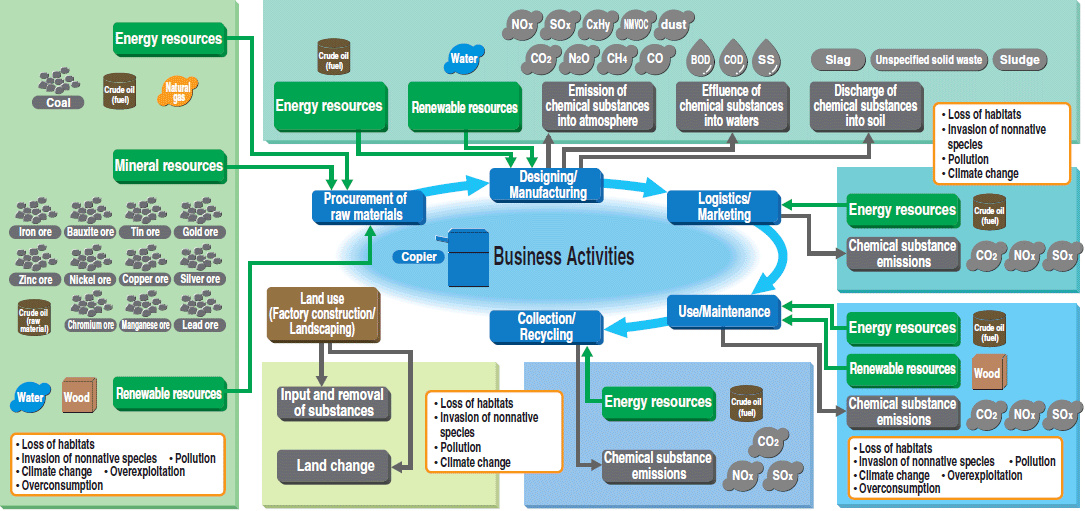Our human society is heavily dependent on the various benefits provided by the ecosystems on the earth, and biodiversity is closely related to these ecosystems. However, we are now losing biodiversity at an unprecedented and rapid pace due to the deterioration of the natural environment. Companies are required to assess the impact of their business activities on ecosystems, prevent the loss of biodiversity, and contribute to its restoration.
The Ricoh Group established the "Biodiversity Policy" in 2009, approved by the Management Committee, believing that the conservation of biodiversity would lead to the creation of a truly affluent and sustainable society. Furthermore, in 2010, we established the " Regulations on Wood Raw Materials for Ricoh Group Products" (an expansion of the "Environmental Regulations on Procurement of Paper Products" established in 2003) to prevent deforestation and to procure raw materials with due consideration for social aspects such as labor. In addition, in 2020, we set a goal of increasing the number of trees by 1 million by 2030 through forest conservation activities that both "conserve" and "increase" the number of forests. Based on these policies and regulations, we are working with various stakeholders to reduce the environmental impact of our business activities, at the same time, we are promoting efforts to maintain and enhance the regenerative capacity of the earth.
The Ricoh Group aims to realize a "nature positive" and "zero deforestation" society that halts the loss of biodiversity and puts it on a recovery track by 2030. To this end, we are working to understand biodiversity risks and reduce the environmental impact of our business activities in cooperation with various stakeholders, while at the same time maintaining and improving the Earth's regenerative capacity.
Basic Policy
We recognize that while we enjoy the benefits of biodiversity, our business activities also have an impact on it. As such, we actively work towards realizing a society living in harmony with nature. We also work on the conservation of biodiversity, with the understanding that biodiversity, climate change, and resource use all mutually influence each other.
From the viewpoint of global environmental conservation and biodiversity protection, this provision must be established to confirm that the wood raw materials used in Ricoh brand products and their accessories are legally obtained with consideration for the sustainability of the place of origin in environmental and social aspects prior to the decision of procurement.
Scope of Regulation
It shall apply to the following items that are made from wood procured by the Ricoh Group:
Requirements for raw materials provided by suppliers
Confirmation of legality of wood in the country of origin at the time of production.
Wood produced from a forest where sustainable forest management is practiced without adverse environmental or social impact at the time of production.
The products delivered to the Ricoh Group do not use wood procured by a "Supplier with Problems."
The policy is based on two criteria: "Paper* Standards" and "Supplier Standards."
Paper Standards(Requirements to procure paper)
Supplier Standards(Requirements for procurement transactions)
*Target: PPC paper, paper rolls
To continuously discuss mid- to long-term issues of the Ricoh Group in the areas of environment, society, and governance at the management level, the ESG Committee, chaired by the CEO, was established in May 2018. The committee meets once every quarter with the participation of Senior Management to discuss the status of initiatives, issues, and investment decisions related to ESG themes, such as biodiversity initiatives, as important themes for management. Its deliberations are regularly reported to the Board of Directors, which then supervises the execution of ESG activities at a high level.
The Ricoh Group has adopted the following basic processes to ensure that biodiversity is properly considered.
We promote biodiversity-conscious activities by clarifying the relationship between our business activities and ecosystems (environmental impacts and risks). To clarify the relationship between business activities and ecosystems, the Ricoh Group has created a "Map of relationships between business and biodiversity" to show the relationship between product life cycles, land use, and other factors and ecosystems.
Target Businesses: Imaging Business, Thermal Business
Target data: Energy resources, mineral resources, renewable resources, chemical emissions to air, water, and soil, land use
*Individual business sites are also evaluated based on the 30 by 30 criteria for certification as a site in harmony with nature.
Map of Relationships between businesses and biodiversity
As a result of the evaluation of the relationship between business and biodiversity, paper procurement accounted for the majority of the evaluation results in the supply chain, indicating that the procurement of raw materials such as pulp and paper has a large impact and risk on ecosystems.
To reduce environmental impact, we promote the use of recycled paper and recycled materials, and at the same time, we procure raw materials in consideration of biodiversity in cooperation with our business units and stakeholders (Chart 1). The Ricoh Group assesses the impact and risks on biodiversity and the results of countermeasures as needed and reviews the countermeasures.
Risks are managed through a company-wide risk management system.
[Chart 1] Stakeholders and Roles Related to "Regulations for Ricoh Group products made of wood"
Target:Planting another one million new trees(FY2020 - 2030)
| Performance | FY 2020 | FY 2021 | FY 2022 | FY 2023 |
|---|---|---|---|---|
| Number of trees planted: a year (K Trees) |
92 | 149 | 97 | 115 |
| Number of trees planted: Cumulative total (K trees) |
92 | 241 | 338 | 453 |
| Progress (%) | 9.2 | 24.1 | 33.8 | 45.3 |
Target:Sustainable Procurement of Paper 100% (FY2026)
| Performance | FY 2023 |
|---|---|
| Sustainable Procurement of Paper Rate(%)※ | 60% |
※Percentage of paper for which appropriate forest management has been confirmed by Ricoh's own certification (based on weight).
FY2023 Main initiative
For more information on biodiversity conservation efforts, please see below ESG data

 Paper Procurement Policy
Paper Procurement Policy


